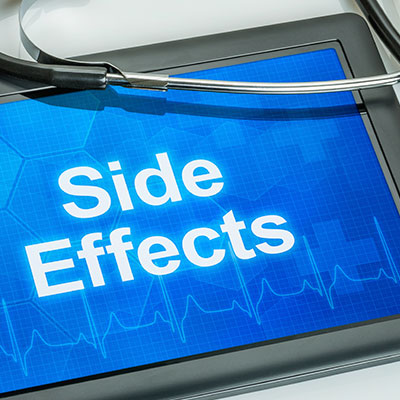Testosterone Replacement Therapy: Common and Less Common Side Effects
Testosterone replacement therapy is generally regarded as safe for treating low testosterone. However, as with any drug or medical procedure, testosterone therapy can still have some potential side effects.
You can avoid most of the side effects of testosterone therapy by working with a reputable doctor.
Common Testosterone Therapy Side Effects in Men and Women

Once a drug is approved, that means it has determined that it is “generally recognized as safe.” However, it is required that all approved drugs list any possible side effects. The list is mainly to protect the drug manufacturer from legal liability. It does not mean that you will experience any of the side effects listed.
For the most part, testosterone therapy is generally regarded as safe.
Common Testosterone Therapy Side Effects
According to most testosterone manufacturers, you should not receive testosterone therapy if you are allergic to testosterone or if you have:
- Prostate cancer
- Male breast cancer
- A serious heart condition
- Severe liver disease
- Severe kidney disease
- If you are pregnant or may become pregnant.
We have found that the safest and most effective way to receive testosterone therapy is via injection. Some of the reported possible side effects of testosterone injections for men or women include:
- Breast swelling
- Headache, anxiety
- Increased facial or body hair growth, male-pattern baldness
- Increased or decreased interest in sex
- Numbness or tingly feeling
Pain or swelling where the medicine was injected.
Less Common Testosterone Therapy Side Effects in Men and Women
Some of the rare or less common side effects of testosterone therapy for men or women include:
- Chest pain, sudden cough, wheezing, rapid breathing, coughing up blood;
- Pain, swelling, warmth, or redness in one or both legs;
- Nausea or vomiting
- Changes in skin color
- Priapism (ongoing erection of the penis) (men)
- Impotence, ejaculation problems, decreased amounts of semen, decrease in testicle size (men)
- Changes in menstrual periods (women)
- Male-pattern hair growth (such as on the chin or chest)
- Hoarse or deepened voice
- Enlarged clitoris
- Painful or difficult urination
- Shortness of breath (even with mild exertion);
- Stomach pain, constipation, increased thirst or urination, muscle pain or weakness, joint pain, confusion, and feeling tired or restless; or
- Upper stomach pain, itching, loss of appetite, dark urine, clay-colored stools, jaundice (yellowing of the skin or eyes)
This is not a complete list of possible side effects. You should consult with your doctor for medical advice about side effects.
Why These Effects are Occur
Any drug has potential side effects. Some of the listed side effects occur because different people have different tolerances to any given medication. You can take a drug, even one that has been prescribed for you, and have some negative reactions, whereas your friend can take the exact same dosage of the same drug and experience some ill effects. That is exactly why drugs like testosterone must list all of their potential side effects.
Potential is the keyword. Testosterone is recommended to treat patients who have been diagnosed with low testosterone. Most patients on testosterone therapy experience little or no side effects. In those patients who do experience some side effects from testosterone, the side effects usually occur because they were not taking their medication properly.
Can You Take Too Much Testosterone?
You cannot technically “overdose” on testosterone, but misuse of testosterone can cause some severe side effects, as mentioned above. If you have used too much testosterone, stopping the medicine has been known to cause some unpleasant withdrawal symptoms, such as depression, tiredness, irritability, loss of appetite, sleep problems, or decreased libido.
However, almost all of these problems occur when people are using testosterone illegally, without a proper prescription or a doctor’s care.
When using testosterone as it is prescribed, it is a safe and effective way to treat low testosterone.
How to Avoid Negative Effects
You can minimize the risk of any side effects by learning to take your testosterone injections properly. Follow all of your doctor’s instructions. Never exceed your recommended dose. Only take the number of injections you have been prescribed per week. If you do experience any side effects, they can usually be fixed by simply adjusting your dose of testosterone.
You can lessen the risk of possible side effects from testosterone therapy by working with an experienced provider of hormone replacement therapy. You should only work with someone who has a proven track record for safety. You should look for a provider of testosterone therapy that is known to carefully monitor their patients and who treats every case as an individual.
The bottom line is, there are side effects of testosterone therapy, but there are also many benefits of taking testosterone. Looking at it closely, the benefits of testosterone replacement almost always outweigh any of its potential risks.
What Do Studies Have to Say About the Safety of Testosterone Therapy?
There have been decades of clinical studies that indicate testosterone replacement is a safe and effective treatment for testosterone deficiency and the standard of care for men and women diagnosed with low testosterone.
Perhaps one of the most significant was a recent “meta-analysis” (a study of studies), which concluded, “the present meta-analysis indicated that testosterone replacement therapy improved the quality of life, increased lean body mass and significantly decreased total cholesterol. In addition, this treatment is well-tolerated and safe for men with hypogonadism [low testosterone].”
The latest research also reverses previous thinking and indicates that testosterone replacement therapy, when used to treat testosterone deficiency, does not increase the patient’s risk of heart attack, and in fact, lowers this risk. The study, published in the European Heart Journal, found that increasing the testosterone levels in men with low testosterone who have suffered a heart attack helped to prevent a second heart attack or other cardiovascular issues.
Similarly, it was once believed that testosterone therapy could increase the risk of prostate cancer. However, a definitive study that involved a review of nearly 150,000 patient cases provided strong evidence that if testosterone therapy is prescribed under proper guidelines, it is safe and doesn’t increase the risk of prostate cancer.
A very recent meta-analysis published in 2020, looking back at testosterone studies over the prior six months, concluded, “In older men with low testosterone levels without well-established medical conditions known to cause hypogonadism, testosterone therapy provided improvements in sexual functioning and quality of life.”
The recently wrapped up long-term “Testosterone Trials” had this to say about the safety and efficacy of testosterone replacement therapy (TRT), “When correctly diagnosed and administered, TRT is safe, and it can improve several aspects of [quality of life].
The best way to avoid any possible side effects of testosterone therapy is to work with a skilled and reputable prescriber of testosterone therapy.
Now that you know more about the safety and possible side effects of treatments for testosterone deficiency, why not take a minute to contact us and learn more about how hormone replacement therapy can improve your quality of life?
Frequently Asked Questions (FAQ)
When do testosterone side effects usually start?
Some side effects, like injection site discomfort or mood swings, may begin within days or weeks of starting testosterone therapy. Others, such as elevated red blood cells or cholesterol changes, typically appear after several months.
How long do testosterone side effects last?
Many mild side effects, such as acne or fluid retention, may resolve on their own as your body adjusts. However, persistent symptoms require medical evaluation and possible dosage adjustments. Serious side effects generally subside once therapy stops.
Are testosterone therapy side effects permanent?
Usually, side effects are not permanent if testosterone therapy is properly managed. However, prolonged misuse or extremely high doses could cause irreversible effects, such as infertility in men or voice deepening and increased body hair in women.
How can I manage testosterone side effects?
Always consult your doctor. Common management strategies include adjusting dosage, changing the administration method, using topical treatments for skin issues, or temporarily pausing therapy. Never alter your dosage without professional guidance.
Does testosterone therapy interact with other medications?
Yes, testosterone therapy can interact with certain medications, including blood thinners, insulin, and corticosteroids. Inform your healthcare provider of all medications and supplements you’re taking to safely manage these interactions.




